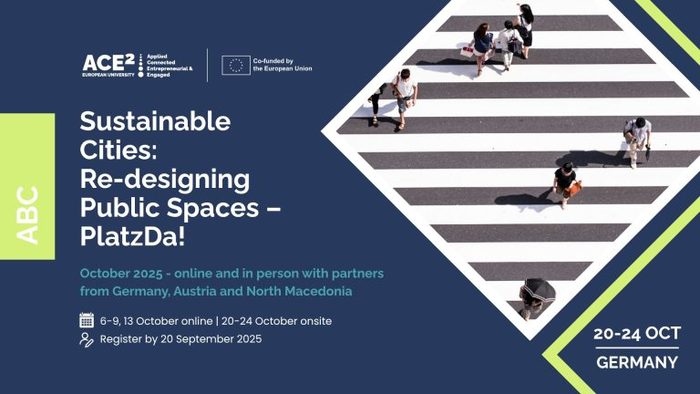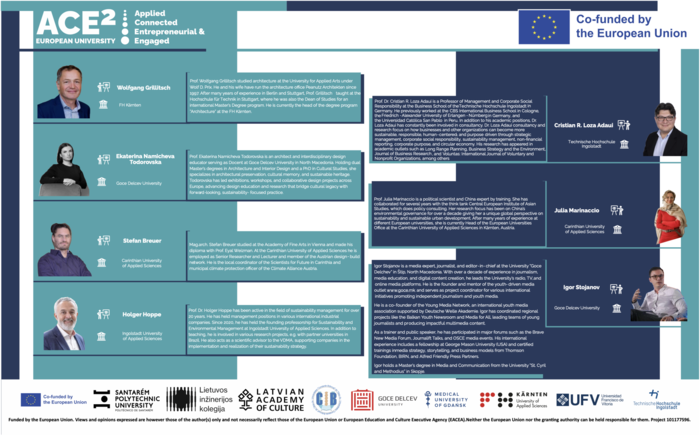Sustainable Cities: Re-designing Public Spaces – PlatzDa!
20.08.2025
Sustainable Cities: Re-designing Public Spaces – PlatzDa!
Date/Period: October 2025
Daily Schedule: will be provided to the selected students during the last week of September
Organized by: Technische Hochschule Ingolstadt (Germany)
Registration and Participation: Register via Google Form
Deadline for registration: 20 September 2025, 00:00 CET
Participants must attend the full session and contribute to collaborative tasks.
Objectives of the Call
The primary objective of the program is to enhance the understanding and strategic relevance of urban sustainability. It aims to equip students with interdisciplinary tools to:
- Explore sustainable transformation through participatory and creative interventions.
- Address real-life municipal challenges in public spaces, specifically in Ingolstadt, Germany.
Specific objectives include:
- Enhance the quality of public spaces: Develop concepts to improve the attractiveness and usability of public spaces.
- Promote sustainable urban development: Address climate change adaptation measures such as de-sealing, greening, shading, and providing access to drinking water.
- Foster social interaction: Create spaces for community engagement, especially for children and young people.
- Revitalize vacant spaces: Develop ideas for the use of vacant ground-floor zones.
- Promote sustainable mobility: Integrate concepts for parking and alternative mobility solutions.
- Participation and awareness: Actively involve the local population and stakeholders in the transformation process.
Course Short Description
Format: Applied Blended Challenge (ABC) Program
Organisers:
- Host: Technische Hochschule Ingolstadt (THI)
- Co-hosts: Carinthia University of Applied Sciences (CUAS) and Goce Delcev University (GDU)
- Location: Ingolstadt, Germany
- Stakeholder: City of Ingolstadt
Short Description: The course is a blended, challenge-based program that immerses students in real-world urban challenges. It combines weekly online learning with an intensive face-to-face project week in Ingolstadt, where students co-develop solutions for challenges involving the use of vacant and ground-floor spaces. The course integrates sustainability science, smart city approaches, stakeholder analysis, and policy communication tools to foster actionable solutions and entrepreneurial thinking in international student teams.
ECTS: 3 credits
Duration
- Online: 6-9 October 2025, 15:00-17:00 CEST and 13 October 2025, 10:00-12:00 CEST
- On-site: 20-24 October 2025
Target Group
Students from ACE²-EU partner universities (Quota: 4 students per university)
Profile:
- Students from diverse academic backgrounds (urban planning, environmental studies, business, public policy, engineering, etc.)
- Motivated to work on real-world municipal challenges
- Interested in sustainability, smart cities, and international collaboration
Expected skills/attitudes:
- Willingness to collaborate in interdisciplinary and intercultural teams
- Proactive engagement in both online and face-to-face sessions
- Openness to entrepreneurial and policy-oriented thinking
Learning Objectives
- Understand the sustainability and mobility challenges faced by urban areas, with emphasis on mid-sized European cities.
- Co-create utilization strategies taking climate change adaptation measures, sustainable mobility, and social aspects into account.
- Translate analytical insights into policy-relevant recommendations and public impact narratives.
- Collaborate in international, interdisciplinary teams, enhancing team-building, communication, and project management skills.
- Communicate proposals effectively, both visually and verbally, during a final pitch to city stakeholders.
Certification
A certificate of attendance will be issued by the course organizers upon successful participation. The certificate will list:
- Course title
- Learning outcomes
- Developed competences
- Duration (10 hrs. synchronous online / 24 hrs. onsite + 56 hrs. independent and group work)
Contact & Coordination
Technische Hochschule Ingolstadt
Prof. Katherine Roegner – katherine.roegner@thi.de

